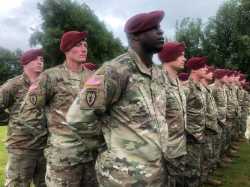[18 / 1 / 1]
https://truthout.org/articles/some-military-families-worry-gop-lawsuits-will-make-it-harder-for-them-to-vote/
For several weeks, Jamie Boyle of Virginia has been checking to see if the ballots she and her husband mailed on October 4 to an elections office in Pennsylvania have been processed. As of late October, she’s still waiting.
Now Boyle, whose husband serves in the Army, is worried about a series of lawsuits filed by Republicans, including the Republican National Committee, that questions the voting rights of some military families. Among the states ensnared in a lawsuit is Pennsylvania.
“In a situation that is already complicated — is my ballot going to get there in time? — now it’s, is my ballot going to get counted?” she said.
The lawsuits challenge the legitimacy of some ballots cast under the U.S. Uniformed and Overseas Citizens Absentee Voting Act, or UOCAVA. The federal law, which was enacted during Ronald Reagan’s presidency and has long had bipartisan support, covers U.S. citizens living abroad, including voters serving in the U.S. military and their families.
If successful, the lawsuits could impact results in a handful of battleground states with razor-thin voting margins that will determine the outcome of the presidential election. They also spotlight the growing scope of disinformation ahead of November 5.
Some military spouses, 92 percent of whom are women, are expressing frustration at the lawsuits — also filed in Michigan and North Carolina — and what message they send to a population that is already dramatically less likely to vote compared to the general voting public, the reasons for which are layered.
For several weeks, Jamie Boyle of Virginia has been checking to see if the ballots she and her husband mailed on October 4 to an elections office in Pennsylvania have been processed. As of late October, she’s still waiting.
Now Boyle, whose husband serves in the Army, is worried about a series of lawsuits filed by Republicans, including the Republican National Committee, that questions the voting rights of some military families. Among the states ensnared in a lawsuit is Pennsylvania.
“In a situation that is already complicated — is my ballot going to get there in time? — now it’s, is my ballot going to get counted?” she said.
The lawsuits challenge the legitimacy of some ballots cast under the U.S. Uniformed and Overseas Citizens Absentee Voting Act, or UOCAVA. The federal law, which was enacted during Ronald Reagan’s presidency and has long had bipartisan support, covers U.S. citizens living abroad, including voters serving in the U.S. military and their families.
If successful, the lawsuits could impact results in a handful of battleground states with razor-thin voting margins that will determine the outcome of the presidential election. They also spotlight the growing scope of disinformation ahead of November 5.
Some military spouses, 92 percent of whom are women, are expressing frustration at the lawsuits — also filed in Michigan and North Carolina — and what message they send to a population that is already dramatically less likely to vote compared to the general voting public, the reasons for which are layered.

